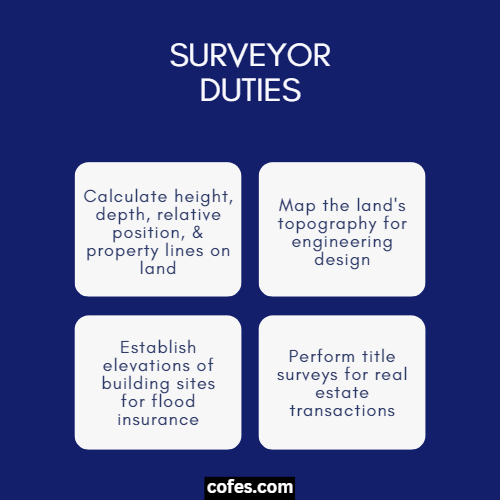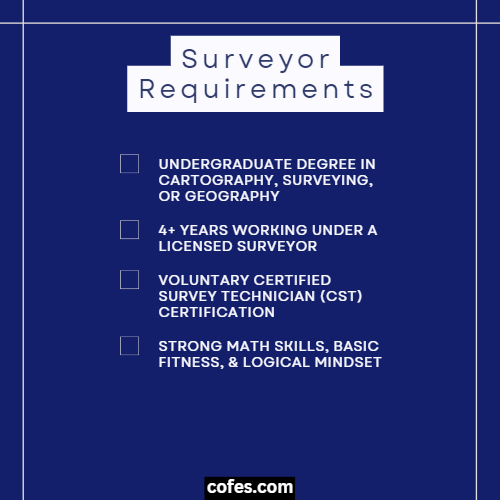Surveyors: The Dying Profession In Land Development
Today, in the U.S., the average surveyor is over 55 years old.
The future is uncertain, with surveying programs slowly becoming obsolete due to low demand.
The shortage of surveying professionals will become more pronounced as the years go on.
With a projected growth of only 2% in the next ten years (significantly below average), it is not surprising that students opt for different land development positions.
Surveyor Job Information
| Official Job Title | Surveyor |
| Average Salary | $80,322 |
| Stress Level | Low |
| Work/Life | Average |
| Job Satisfaction | Low |
| Career Advancement | Low |
Surveyor Job Description
What Is a Surveyor?
A surveyor creates official land, airspace, and water boundaries.
Oftentimes, surveyors work with engineers, architects, and land developers.
Surveyors are well-versed in local regulations and laws that may interfere with a new project.
Additionally, surveyors can be excellent networkers and have connections with individuals in influential positions, such as local government.
Surveyors are experts in structural issues and can assess the approach to constructing various buildings and provide insight into the next steps when issues arise.
What Does A Surveyor Do On A Daily Basis?
Daily, surveyors will go to project sites and calculate the height, depth, relative position, and property lines of pieces of land.
They spend the majority of their time outdoors and on-site.
Additionally, they will map the land’s topography for engineering design, establish elevations of building sites for flood insurance, perform title surveys for real estate transactions, and certify that structures are built according to design.
The tasks surveyors must perform are so extensive that they often have assistants to speed up the process.

Responsibilities, Duties & Roles Of A Surveyor
An overview of the roles and responsibilities of a surveyor is listed below.
- Establish official land and water boundaries.
- Look for evidence of previous boundaries and determine where those boundary lines are
- Prepare plots, maps, and reports,
- Work with mapmakers (cartographers), construction managers, and architects.
- Formally present findings to clients, government agencies, and more.
- Write descriptions of land for deeds, leases, and other legally binding documents.
- Provide expertise in courses regarding their work.
- Measure distances, directions, and angles between points on, above, and below the Earth’s surface
Surveyor Salary
Average Salary
The average salary for a surveyor in the U.S. is $80,322.
This can vary due to location, experience, industry, or other factors.
Starting Salary
The average entry-level salary for a surveyor in the U.S. is $65,000.
Senior Salary
The senior salary for a surveyor in the U.S. is $98,189.
How To Become A Surveyor
The Entry Level: Certification, Training & Degree
Surveyors usually pursue a 4-year undergraduate degree in cartography, surveying, or geography and then work under a licensed surveyor for four years.
The work experience will be critical to gaining skills and understanding so they can eventually work independently.
Afterward, they must obtain a surveyor’s license.
Most states accept the test results of two exams administered by the National Council of Examiners For Engineering and Surveying.
Other Skill Sets, Requirements & Qualifications
- Strong Mathematical Skills:
- An ideal candidate must grasp algebra, trigonometry, and geometry well to be good at their jobs.
- Growth Mindset:
- Surveying requires a lot of professional development since laws and regulations are constantly changing.
- Surveyors need to stay up to date and adjust their practices accordingly.
- To be successful in this job, you must constantly be learning.
How Long Does It Take To Become A Surveyor
To be a land surveyor, you must be licensed.
Surveyors usually pursue a 4-year undergraduate degree and then work under a licensed surveyor for four years to earn their license.
During this time, work experience will be essential to their development.
Afterward, they must obtain a surveyor’s license.
Most states accept the test results of two exams administered by the National Council of Examiners For Engineering and Surveying.
Is It Hard To Become a Surveyor?
Yes.
It takes eight years to be able to conduct surveying on your own.
This job can be physically demanding and require a lot of travel.
It can be difficult for someone looking to start a family and build roots.
It is also tricky due to the lower demand for surveyors, with a projected growth of only 2% over the next decade.
The future of surveying is unclear.
Surveying Career Paths
The Surveying Roadmap
While requirements may vary depending on the state you reside in, you must be licensed to be a land surveyor.
Surveyors usually pursue a 4-year undergraduate degree and then work under a licensed surveyor for four years to earn their license.
During this time, the work experience will help develop your skills and understanding further so they can go off independently.
After this, you need to obtain a surveyor’s license.
Most states accept the test results of two exams administered by the National Council of Examiners For Engineering and Surveying.
Employers like to promote employees who have earned a Voluntary Certified Survey Technician (CST) certification from the National Society of Professional Surveyors (NSPS).
The four-tier certification is available at stages throughout the first six years of work experience as a surveyor.

Projections For Growth In Surveying Jobs
According to the U.S. Bureau of Labor and Statistics, Surveying is a dwindling profession.
With a projected growth of only 1%, it is uncertain how much longer they will be needed.
In Summary: Is Surveying A Good Career?
No.
Surveying is a dying profession with a projected growth of 1% over the next ten years.
Aside from the slow growth, job satisfaction remains low, and this job can be physically demanding, making it unappealing.
Working Conditions
Can Surveyors Work Remotely From Home?
No, although there is some indoor work involved in surveying.
Due to the nature of their work, surveyors often need to physically be on-site to fulfill most of their tasks and responsibilities.
How Many Hours Does A Surveyor Work?
Surveyors typically work full-time.
However, their hours may extend during the summer when the days are longer.
Can A Surveyor Work Part-Time?
It is rare for a surveyor to work part-time due to the complexity of their work.
What Are The Average Vacation Days Of A Surveyor?
According to Indeed, the average number of vacation days among employees in the US is 11 days.
Several companies reward long-term employees with additional vacation days and flexibility.
Alternative Careers & Similar Jobs to a Surveyor
- Purchasing Manager
- Construction Manager
- Brand Strategist
- Auditor
- Cost Estimator
- Supervisor
- Product Manager
- Security Manager
- Branch Manager
Surveyor Resume Tips
If you are applying for a job as a surveyor, include a cover letter outlining why you’d be a good fit for the position you are applying for.
Including a professional summary is also a good way to highlight your qualifications in a straightforward way.
Remember to showcase your relevant skills and list your education and certifications.
When describing your work history, focus on transferable skills and quantitative results you can bring to the organization.
It also doesn’t hurt to provide a list of contacts within the industry with whom you have strong relationships.
Surveyor Interview Questions
Q1: Why do you want to work for our company?
Why It Works: Hiring managers want to know what your motives are. This is an excellent opportunity for you to share what
Q2: Why are you leaving your current position?
Why It Works: This can help recruiters understand where you’re coming from and what you’re looking for in the future.
Q3: Where did you do your apprenticeship?
Why It Works: Understanding who you worked for during your learning phase can help recruiters learn your work style.
Jobs Related To Surveying
- Land Surveyor
- Legal Surveyor
- Property Surveyor
- Commissioned Land Surveyor
- Quantity Surveyor
- Rural Practice Surveyor
For HR Managers: Tips For Hiring A Surveyor
Key Characteristics To Look For In A Surveyor
- Basic Fitness:
- Surveying requires working outdoors and standing for long periods.
- Additionally, Surveyors may need to walk long distances if the land they are surveying is large.
- No Criminal History:
- Traveling is also part of the job regarding surveying.
- This means that ideal candidates should be able to pass a background check and not have any prior history with the police.
- A person’s criminal history can sometimes interfere with their ability to travel, which may hinder their ability to perform their job to the best of their ability.
- Strong Mathematical Skills:
- An ideal candidate must grasp algebra, trigonometry, and geometry well to succeed at their jobs.
- Growth Mindset:
- Surveying requires a lot of professional development since laws and regulations are constantly changing.
- Surveyors need to stay up to date and adjust their practices accordingly.
- To be successful in this job, you must constantly be learning.
Minimum Level of Education & Experience
Surveyors should hold an undergraduate degree in cartography, surveying, or geography, at the very least.
Typically after this, you work under a licensed surveyor for four years.
The more experience under your belt, the better.
